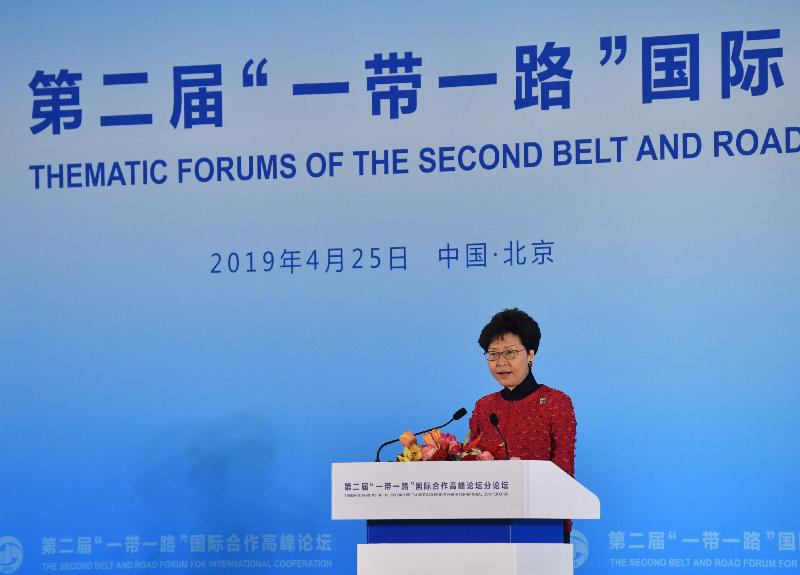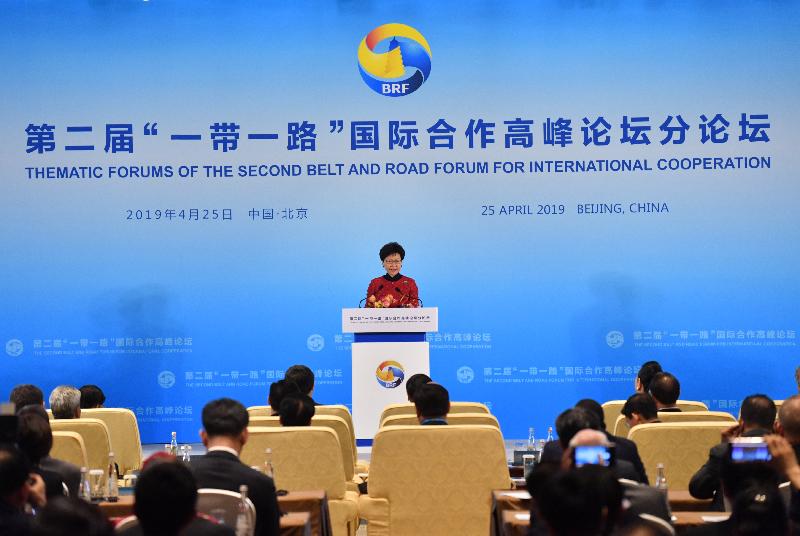Following is the speech by the Chief Executive, Mrs Carrie Lam, at the thematic forum on sub-national co-operation of the second Belt and Road Forum for International Cooperation in Beijing this afternoon (April 25):
Madam Li Xiaolin (President of the Chinese People’s Association for Friendship with Foreign Countries), Mayor Chen Jining (Mayor of Beijing), your excellencies, distinguished guests, ladies and gentlemen,
Good afternoon. It gives me great pleasure to attend today’s forum on regional co-operation, and to share a few thoughts on Hong Kong’s position as an international gateway for Belt and Road regional co-operation.
Hong Kong is Asia’s world city. We are one of the most competitive cities in the world, and faithfully practise a free and open economy. Our strategic geographical location as a bi-directional gateway connecting the Mainland and other Belt and Road countries and world-class infrastructure have underpinned Hong Kong as an international financial, transportation and trade centre as well as an international aviation hub. Moreover, under “One Country, Two Systems”, Hong Kong enjoys a high degree of autonomy in conducting its external affairs and has established extensive and strong overseas connections. We strongly believe that these unique advantages well position Hong Kong to play a pivotal role in enhancing international and regional co-operation in the context of the Belt and Road Initiative.
In terms of trade and economic co-operation, Hong Kong has been actively seeking to forge stronger ties by, for example, signing Free Trade Agreements and Investment Promotion and Protection Agreements with our Belt and Road partners. The Hong Kong-ASEAN Free Trade Agreement scheduled to take effect later this year and our three Economic and Trade Offices in Singapore, Jakarta and Bangkok will surely deepen our co-operation in the Southeast Asian region.
But Hong Kong is not only about business. Hong Kong also offers a platform for cultural exchanges between East and West, and can play a key role in enhancing people-to-people bonds. Our arts development, architecture, traditions, cultural heritage, cuisine and religions are a testimony of the harmonious integration of different cultures. We encourage our people to reach out to the diverse cultures, such as by sponsoring arts performance and youth exchanges through different funding schemes, and providing scholarships to encourage outstanding students from Belt and Road countries to study in Hong Kong universities.
And as a well-developed city with rich experience in city management, Hong Kong is prepared to share our knowledge and expertise with our Belt and Road counterparts in a variety of fields, such as airport management, railway operation, emergency services, green and sustainable development, etc. Indeed, I have made capacity building one of Hong Kong’s contributions to the Belt and Road’s people-to-people connectivity.
To give you some examples, our world-renowned Independent Commission Against Corruption has connected with over 40 Belt and Road countries to provide training and other forms of assistance to their anti-corruption agencies. Our disciplined services departments, such as the Police and the Fire Services Department, are offering training programmes for their overseas counterparts.
Our MTR Corporation, which has a long history of providing safe, reliable and efficient railway services, established the MTR Academy in 2016 for training personnel in railway management and operation worldwide. In 2017 and 2018, over 400 executives from 22 countries attended its programmes. Likewise, our Airport Authority, which manages one of the best airports in the world, established the International Aviation Academy in 2016 to train local and regional air transport management talents. So far, participants from eight Belt and Road countries have joined a master programme in air transport management offered by the Academy. We will continue our efforts, with a view to further strengthening our ties with other Belt and Road economies.
As today’s forum is on regional co-operation, I must mention the Guangdong-Hong Kong-Macao Greater Bay Area development. Featuring “one country”, “two systems”, “three customs territories”, “three legal systems”, etc, the Greater Bay Area development is an ideal example of how economies with different characteristics can work together to achieve a win-win outcome.
For those who are less familiar with the Greater Bay Area, it is the most vibrant region of China covering an area of 56 000 square kilometres. It brings together the two Special Administrative Regions of Hong Kong and Macao as well as nine flourishing cities in the Guangdong Province. Collectively, they represent a population of over 70 million people and a combined GDP of US$1.6 trillion.
As a national development strategy, the Greater Bay Area is destined to be a key engine for regional co-operation and joint development. According to the Outline Development Plan of the development promulgated by the Central Government in February this year, the Greater Bay Area is set to provide solid support for the Belt and Road Initiative. Hong Kong will for sure leverage on our strengths and advantages that I just mentioned and make the best contribution to these two initiatives.
Ladies and gentlemen, Hong Kong is geared up to actively participate in the Belt and Road Initiative. We look forward to working with you all, with a view to achieving inclusive and sustainable growth for all. Thank you very much.





